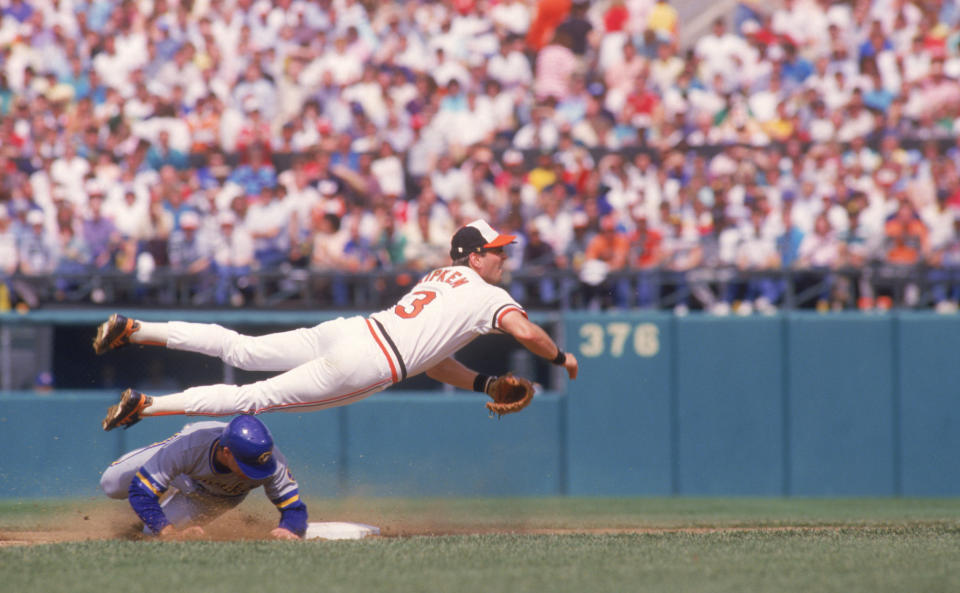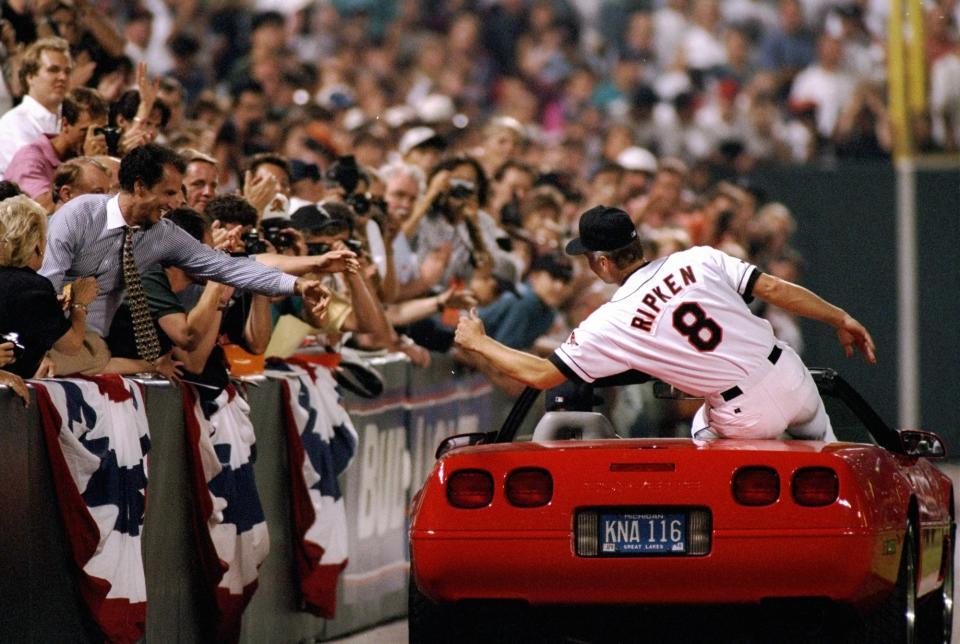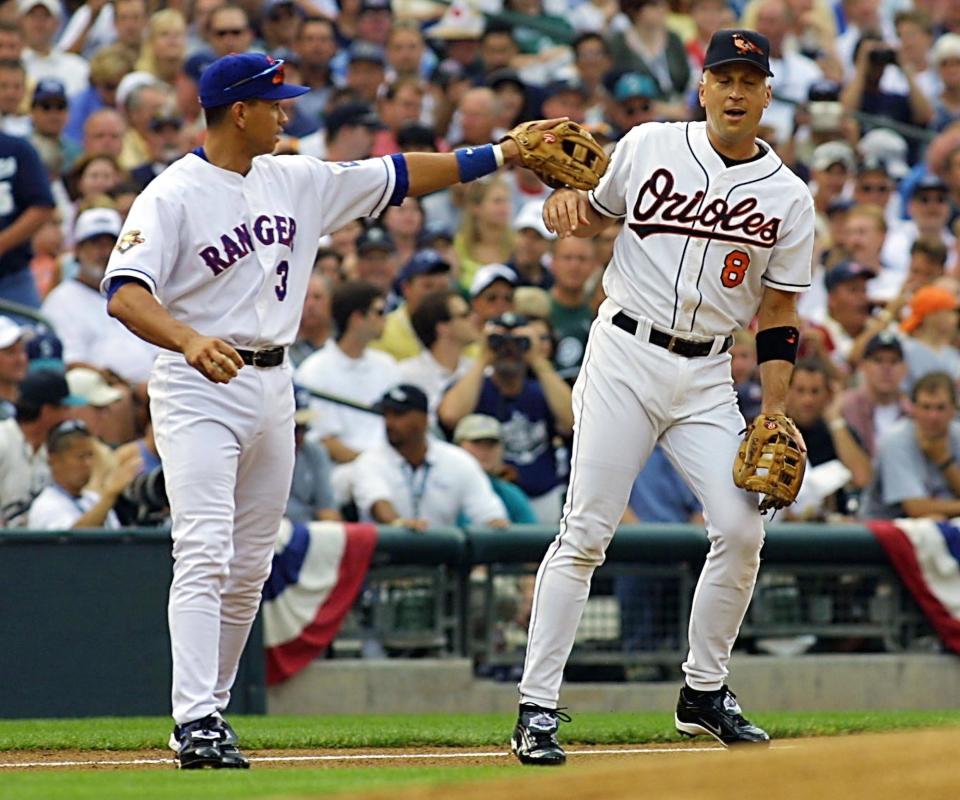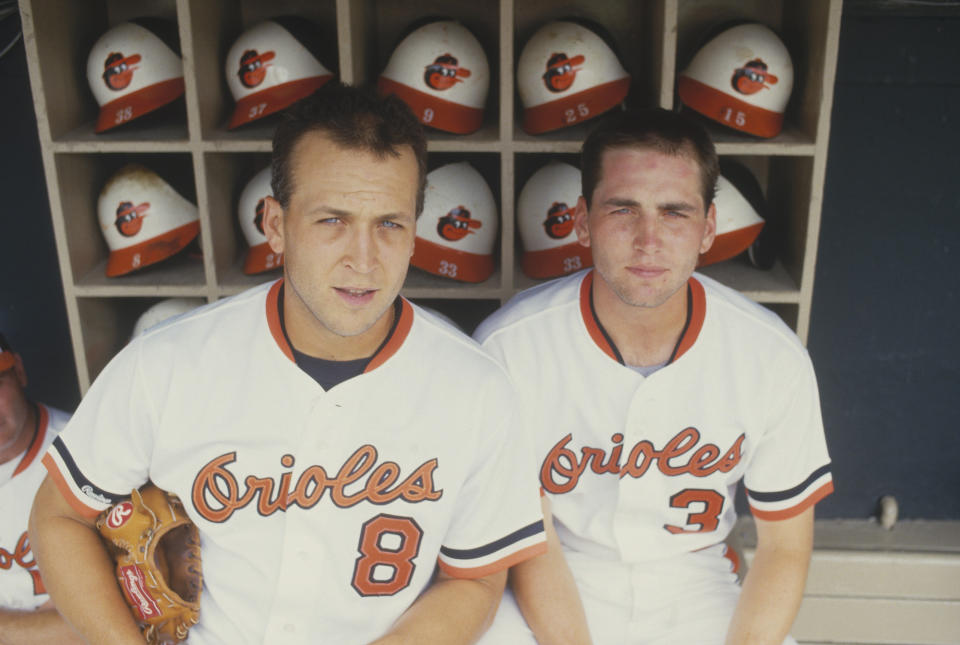Cal Ripken Jr. Opens Up About the Hardest, Most Painful Games He Ever Played

No one will ever again do what Cal Ripken did. He played 2,632 Major League Baseball games in a row, beating Lou Gehrig's unbeatable record in the process. He was a formidable competitor outside of that, but that will be his legacy. His Hall-of-Fame career is a testament to the grueling demands of baseball greatness, the subtle rhythm and constant fire required to compete across 162 games-and the playoffs, if you're somebody like Ripken.
That was what we got together to discuss. The MLB's division and wild card races are coming down to the wire now, and the Orioles legend is covering it all for TBS. He'll continue through the playoffs: TBS has laid claim to the whole American League postseason schedule. But while we were there to chat about how this season has come together, we also had time to talk legacies, his stance on the Make Baseball Fun Again movement, and how he may just have done for his game what Magic Johnson did for basketball.
Did you see that little scuffle between Madison Baumgartner and Yasiel Puig?
I saw it was a full-swing bunt and he threw him out at first base. And then there were words, and words created more words and then the benches cleared.
What do you think of that kind of show-of-emotion in general?
I don't think you can put a general blanket over it. I think it's a case-by-case basis. I remember some of the old principles. You've got to be careful. Sometimes you can use it to your own benefit-to fire up your own team if you feel like they're a little flat. But more often than not, it can fire up the other team. And I remember my Dad used to always say, if they're sleeping, let 'em sleep. Let them wake up on somebody else. As soon as you start throwing at people, or creating situations on the field, all of a sudden you allow them to wake up and change their focus.

I spoke to Carlos Correa a while back, and he's one of those younger guys trying to start a movement toward showing more emotion-not necessarily trying to start fights-but trying to express themselves on the field. Where do you stand?
I would advocate for being yourself. Whatever be yourself means, then that's the way it is. I wouldn't start to choreograph or produce what I'm going to do if I hit a home run, though. I don't know if that's what Carlos is talking about or not. If you're outgoing and that's how you play the game, with enthusiasm-Bryce Harper plays the game hard, plays it with outward emotion, and I would never tell him not to. Sometimes you deal with the consequences of that, but I would encourage people to be themselves. But when you start choreographing home run trots, that's not a reaction anymore. That's a planned response, and I don't advocate that.
Did you follow a code of conduct as a player?
Well I think there is such a thing as sportsmanship, and professionalism, and respecting your opponent. Because all good things that happen to you, many times there's a bad thing that happens over there. So when you were kids, you were taught sportsmanship. And being considerate to the other side, and competing in the right way. So maybe that's being challenged more: What is the right way to compete?
You should enjoy yourself. I hear all that. But in my own play, there was a code of conduct. There was a respect for the other side, and it wasn't necessary to drag somebody else through it. When you have success, when a pitcher gives up a home run, you're happy, he's not. So I didn't feel the need to overly celebrate. You had the feeling that you won that battle, and that was good enough for me.

Speaking of a guy like Correa, some say you paved the way for bigger, taller shortstops in the game.
I've heard Derek Jeter and Alex Rodriguez give me credit for giving them an opportunity. I think that's a little bit wrong. But I do think the success I had at the position, being a bigger guy-I was the tallest and biggest guy that played [at shortstop]-changed the mindset of consideration. So instead of automatically thinking, "Hey, you're too big to play shortstop, let's go play third base," someone would take a minute.
I kind of compare it to Magic Johnson running the point for the Los Angeles Lakers years ago. He's a 6'9" guy, and you're thinking, how can a 6'9" guy run the point? But there were a lot of advantages to him being able to see the floor, looking over the guard that's on him, passing into the post. So that mindset all of a sudden changed. People said, "OK, if we have a guy that's bigger and can bring the ball up the court, that's an advantage."
Is there anyone around today you think you'd really enjoy playing with?
We just got finished doing the Detroit-Cleveland game on Sunday, and I always saw Miguel Cabrera as being the best hitter, a Triple Crown guy, and someone who brings stability to the middle of that lineup. Wouldn't it be fun to hit in front of him? Wouldn't it be fun to hit behind him?
Sometimes I think of shortstop and second base. Who would I love to turn double plays with? I had a chance to play with the Hall of Famer Robbie Alomar, and it was fun to try to get more execution out of his ability, because his skill level was really high. Robinson Cano would be fun to play with up the middle. He seems to make all the plays look really easy, and he's strong. Superstar players like Harper and Trout. Manny Machado would probably be fun to play next to. If he played third and I played short-or vice versa-the range that he has to his left would allow me to move up, even on pull hitters. Sometimes you kinda dream about those scenarios.

A year or two back, there was a lot of talk that it's becoming a pitcher's league. Do you think that was true then, or true now?
The batting averages were coming down, and pitchers were dominating. ERAs were down a little bit. I think in many cases, it's cyclical. It seems like every pitcher throws 95 now. So the specialty nature of the bullpen, and the fact that the velocity is up all the way across, makes it difficult for the hitters. Strikeouts are really high. I don't know if runs scored is that much different than it used to be.
Kansas City's bullpen really gave you a model-having power guys take care of the seventh, eighth, and ninth inning of a ball game. They shortened the game so effectively and won a World Series. I think facing the starter twice and then facing someone specially matched up for you the third time through the order, and the fourth time through the order you're facing the closer-that makes it really hard for the hitter. So I think, without having the statistical information to back it up, I still think the pitchers are dominating a bit more than the offense.
Alex Rodriguez retired this season. How will he be remembered?
I think only time will tell. I think part of the equation is really understanding the full story of who Alex is. I guess each person will have to make their own judgment. The stats that he put up, and the ability to play, are impressive. We all can admire what he's been able to do. But the fact that he has the connection to performance enhancers [PEDs] doesn't allow you to fully understand what he's accomplished. So I don't know, it's a tough one.

There's going to be people who see it as, he just used it here. There's going to be people that say, what if he used it all the way through? I think only time will tell how people see his legacy.
Do you think that connection is a disqualifier for Hall of Fame consideration?
Well, if you have a vote for the Hall of Fame, you have to consider all things. If you don't feel you have enough information, it's difficult to actually vote for that. So I can't see how that's not part of the consideration. And the hard part about that is, to what extent was it used? You just don't know. You don't know the full picture. And I think that historically has hurt people being considered for the Hall of Fame, if there is some cloud that's over the top of them. And I think it will probably be that way for Alex, too.
The AL East, your home division, is once again really competitive this year, with a high level of play.
It's amazing what the Yankees were able to accomplish this year, even after it seemed like they pulled the plug on Andrew Miller and [Aroldis] Chapman. You've got two of the best left-handed arms out in that bullpen, you're thinking how in the world... I guess they're rebuilding and looking to the future, and all of a sudden they're in a position to make the playoffs.
The Orioles were away from the playoffs for a long time, but under Buck Showalter they've been back in and a playoff-caliber team. Any one team can win that division, which it seems like has been proven. Toronto really made a good run last year-they just overpowered the league offensively. Boston's come back, and now their pitching is what you sort of expected from that team-especially with John Farrell in charge. They seem to be the more consistent pitching team out in the East. And pitching is ultimately where you go when you're trying to figure out who has a chance to win.
Who do you see as being in the strongest position going into the playoffs?
The Cubs clinched early, so their question is how do you maintain your intensity and continue to play. My opinion for regular players is you can't just start giving them off days. There's a timing, and you need to play and continue to have their at-bats. If you're not playing right up to the end of the season in that competitive mindset, is that a negative? Sometimes in recent history you've had the winners of the Wild Card game get past the sudden death moment and they're in playoff mode. And that's been effective.

I thought Cleveland was positioned pretty well, until they had the injuries to their starting staff. Especially the last one, the line drive off Carlos Carrasco's wrist. And he's got nasty stuff. Just seeing what's happened to those guys, they've had the best power pitching. Going into the playoffs, any team that in a short series, they're going to be dangerous. But I think they're going to have a little bit of a tougher road now.
Texas is positioned pretty well. They might have a chance to rest up a little bit and play. But it could very well be Toronto and Baltimore down the stretch. They're vying for their playoff lives and competing against each other, and they might carry that into the playoffs.
You're known for playing quite a few games in a row. Do you think that allowed you to put together some of those great seasons in that span-that you never had a time out to get off-rhythm?
Well I think that when you're in a slump, you find your slump out in the game. You try to figure out how to make those adjustments in the game. I think all everyday players want to play every day. You don't want to have to worry, "If I go 0-for-4 today am I playing tomorrow?" So that was the biggest value of being an everyday guy.

Sometimes I wonder if I had hand-picked my off-days, and said, if I get eight off-days a year, and I picked them against pitchers I don't hit too well against, I think you could project your average to be better. But in those games that I would pick, they're the game's best pitchers. And your team needs your best lineup out there to try to win. So it seemed to be ridiculous. I always thought that you should bring it to the ballpark every day to try to meet that challenge. And if the manager chose you, then you played.
Do you remember a moment, or a game, or a day when it seemed the hardest to go out there and play?
There were a bunch of injuries that were tough. After the record was broken, I played through a herniated disc in my back in 1997. At that point, we had Eric Davis go down. He was diagnosed with cancer. Robbie Alomar got hurt that year and he was on the disabled list. And we were ahead of the Yankees, and the Yankees were pushing us a little bit. And I almost felt compelled to say, OK, I've been playing to want to be on a winner all this time. We're really good, and I don't want to miss this.
So I asked the doctor if I could do any permanent damage by playing through it, and he said, "No, the pain's going to be too intense. You won't be able to play through it." And I go, "Just what if I can? Would I do any permanent damage?" He said I wouldn't. So I played through that, which was very gratifying. And I performed and we pushed the Yankees back and we ended up winning the division. So that whole time period was hard-six weeks of that.
But I think you learn that players can't play 100 percent all the time. So you're playing at some level less than 100 percent. How much less than 100 percent you feel you can compete is a personal thing, and I always felt that I still had a contribution to make even when I was 90 percent, or 80 percent. I pushed myself, and sometimes I had some of my better games when I was under the weather.
You Might Also Like

